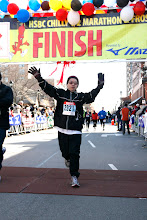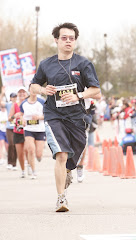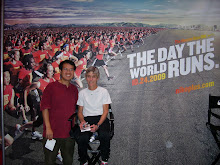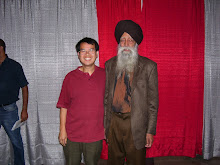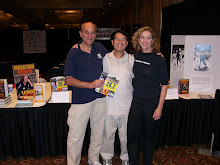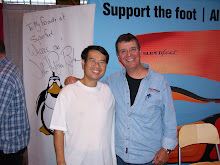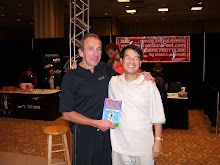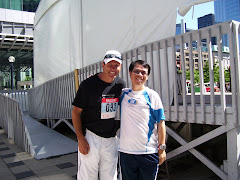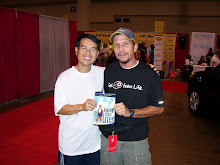I finished reading Jeff Galloway's Marathon You Can Do It! c2001 last night. It's the most informative book I've read so far on training for a marathon. I really like his training programme. Here are some quotes from the book:

"The marathon stands out as one of the most esteemed of life's achievements, but it has to be won by pulling from within oneself physical, mental, and spiritual resources over an extended period of time...only one-tenth of 1 percent of the population does it...The title of marathoner has, from the beginning, been awarded to those who went the distance under their own power whether they ran, walked, crawled, or tiptoed...the marathon course has room for everyone - elite runners, joggers, run/walkers, walkers, and wheelchair athletes. Road racing, including the marathon, is like no other sporting event in that the casual athlete can participate in the same event as world-class athletes...that medal symbolizes a significant internal journey that has unlocked treasures that will continue to enrich you." (p. xii-xiii, 58, 84)
"The marathon is primarily an endurance event...[maintenance runs] consolidate the endurance gains acquired during the previous week's long run...[walk break] this is your secret weapon. Walk breaks allow your running muscles to recover before they are injured and conserve your energy so you can exercise for longer periods, which builds the endurance you need...The most important walk breaks are the ones taken during the first mile...when taken from the beginning of all long runs, walk breaks erase fatigue, speed recovery, reduce injury...by alternating walking and running, from the start, there's virtually no limit to the distnace you can cover." (p. 3, 5, 13)
"The long run will help you more than any component of your training program. By going slowly, you can burn more fat, push back your endurance barriers, and run faster at shorter distance races...you can't run too slowly on the long runs...the day before the long run should be a no-exercise day." (p. 10, 12)
"...staying low to the ground and taking more steps per minute...keep the stride short so you can maintain a light, quick step on each of these pick-ups" (p. 24-25)
"During the 48 hours before the marathon, drink at least four to six ounces of water every hour you're awake...[salt] is probably the leading cause of dehydration for most marathoners...the next day, walk for 30 to 60 minutes...after a marathon, don't race for at least five weeks...a race longer than 15K up to 30K, such as a half-marathon, will require a two- to three-week vacation from long runs." (p. 102)
"Weight work can strengthen some leg muscle groups more than others (and knock your running motion off balance), so it is not recommended for runners." (p. 116)
"A longer wait between meals increases your appetite, which leads to overeating...it's better to eat seven to nine small meals a day rather than two or three bigger ones...consists mostly of complex carbohydrates balanced with some protein and a little fat...when you let the blood sugar level get too low, you'll get hungry, feel drowsy, lose your focus, and be susceptible to quit early." (p. 134, 141)
"Running regularly for more than 45 minutes at a time (even with walk breaks) trains our exercising muscle cells to be fat burners at all times of the night and day...conserves glycogen for later use as you burn off the extra blanket around your stomach or thighs" (p. 134-135)
"Two studies of runners have been done over 40- and 50-year periods. Both showed less incidence of arthritis and other joint problems for runners as opposed to non-runners." (p. 156)
"Two studies of runners have been done over 40- and 50-year periods. Both showed less incidence of arthritis and other joint problems for runners as opposed to non-runners." (p. 156)
"Temporary aches and pains will come and go throughout a marathon program, usually disappearing after a day or so, and thus indicating that you probably don't have an injury...it's a mistake to stretch a muscle to its limits when it feels tight or fatigued...try massage, walking, or a shortening of stride length before stretching...stretching fatigued muscles can tear the fatigued fibers, producing injury and increasing recovery time" (p. 163)
"Stretching is the third leading cause of injury among runners...the best warm-up for running has been the following: 1) walking, 2) very slow jogging or 3) gradually picking up your pace to 'normal'." (p. 168)
"Stretching is the third leading cause of injury among runners...the best warm-up for running has been the following: 1) walking, 2) very slow jogging or 3) gradually picking up your pace to 'normal'." (p. 168)
"Running below 70 percent of your maximum heart rate, you are unlikely to over-train in intensity...By keeping the heart rate between 70 and 80 percent of your maximum rate, you can assume that your effort will normally produce a creative stress on the system, causing it to improve." (p. 176)




















